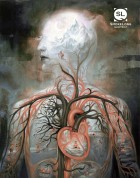One of the elements of “We Lose Our Virginities” that strikes the reader right away is the first-person plural. How did you come to choose that point of view?
I’ve been slowly making my way through Simon de Beauvoir’s The Second Sex, and I was drawn to this passage: “Women—except in certain abstract gatherings such as conferences—do not use ‘we’; men say ‘women,’ and women adopt this word to refer to themselves; but they do not posit themselves authentically as Subjects.” Although, with phenomena like the #metoo movement and the exponential growth of participants in women’s marches and protests, access to unity in womanhood is starting to feel more and more pervasive, and hopefully this is a step toward seeing ourselves as active subjects rather than the passive “other.”
This story is interested in the idea of woman-as-community, and especially in the shared experiences that might take place in such a space. Virginity and what it is to “lose” one’s virginity has such wildly disparate connotations depending on one’s gender, or the gender one was assigned or raised as, and, for women, there are all of these conflicting ideas—false dichotomies, really, of girlhood versus womanhood, and purity versus vulgarity, and chastity versus debauchery. To have sex for the first time is to sort of debunk these strange myths about virginity that we’ve been told all our lives, and I wanted to capture the surrealism of that shared experience.
Alfred Hitchcock said—or maybe it was said of his films—that he shot his love scenes like murders and his murders like love scenes. You’ve written the loss of these narrators’ virginities as something all its own, but where would you put it on that Hitchcock spectrum?
That idea of finding love in violence, and violence in love, is definitely something I’ve considered, and have often tried to navigate in my work. But I also think that Hitchcock is fringing on dangerous territory there. As soon as we allow that line between love and violence to be blurred, we’re offering sympathy to abusers and softening what it means to be violent toward another person in the name of love, which is so often an abuser’s defense. In this story, when the “we” is no longer consenting to the act, and the boys become violent, the “we” experiences a transformation from the beautiful, this tranquil garden scene, into the grotesque, and hopefully this reads as a separation between love and violence rather than a convergence of the two. Once something becomes violent, it too becomes ugly.
Flash fiction is the perfect arena for this potent, surreal story, its brevity allowing the enormity of the moment to resonate in ways a longer story wouldn’t. Do you write a lot of flash fiction? What’s your relationship or thoughts on the increasingly popular form?
This is actually one of my very first pieces of flash, but I immediately fell head over heels, and now I’m writing a series of flash pieces all using the first-person plural. Each piece is about a different event or experience that is difficult for me emotionally, so maybe the decision to keep them short was a selfish one. I do think, though, that because these stories are about a community and, hopefully, an inclusive “we,” that having each experience as a brief encounter, a snapshot of an event, might allow each piece to exist as something like a photograph that readers can frame in whichever way best speaks to them, personally.
Lastly, what are you working on now?
This piece, as well as the other “we” stories I’m writing, make an appearance in the novel I recently finished writing, and, when I realized that they belonged in the manuscript, they sort of blew the whole project wide open. The novel is called Thin Girls, and it explores eating disorders, fad dieting, and diet cults, as well as women’s relationships with food, eating, and bodies more generally. It’s been hard to write, because who doesn’t have a complex relationship with their body these days, but it’s also been really fulfilling and therapeutic. All I hope is that some of the catharsis that writing it afforded me is accessible to those who read it. The manuscript is with my agent right now, so stay tuned!



 The SmokeLong Grand Micro Contest (The Mikey) is now an annual competition celebrating and compensating the best micro fiction and nonfiction online.
The SmokeLong Grand Micro Contest (The Mikey) is now an annual competition celebrating and compensating the best micro fiction and nonfiction online.